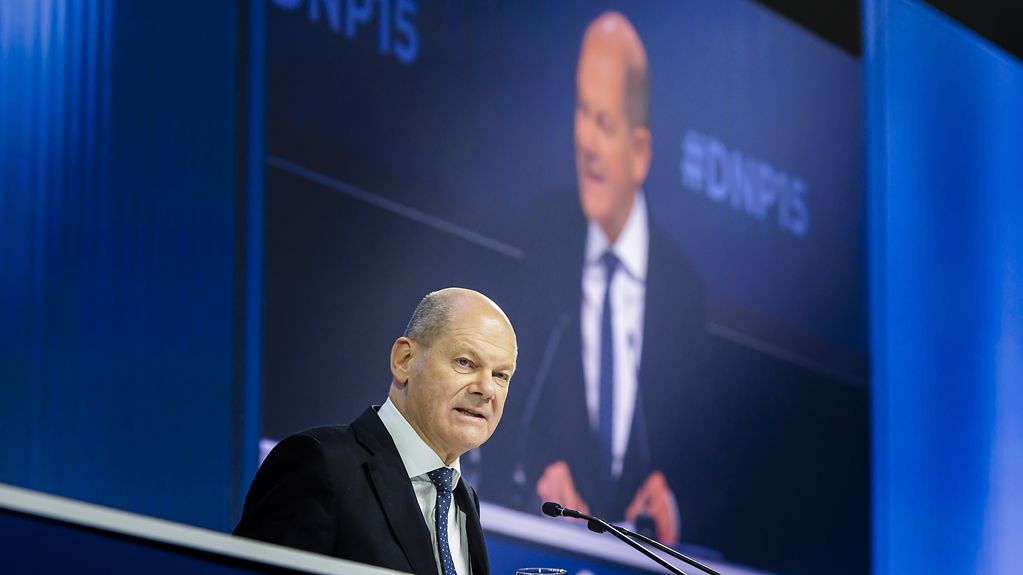15 years of the National German Sustainability Award
Federal Chancellor Scholz congratulated the German Sustainability Award Foundation on its 15th anniversary, highlighting the important work it has done over the past 15 years. Change was possible, the Federal Chancellor stressed, "providing we change our mindset and put fresh ideas into practice."
3 min reading time

Federal Chancellor Scholz at the National German Sustainability Award ceremony: sustainability is the key to long-term success.
Photo: Federal Government/Grabowsky
Federal Chancellor Olaf Scholz opened this year's National German Sustainability Award ceremony in Düsseldorf. He congratulated the award winners as well as all of the nominees.
This year's honorary prize winners are Prince Albert of Monaco, cradle-to-cradle design inventor Prof. Michael Braungart, model and benefactor Toni Garrn, French singer Zaz, and singer-songwriter Michael Patrick Kelly. Prizes are awarded in the categories of business enterprises, municipalities, research, architecture and, starting in 2022, sport. Special prizes are also awarded for global partnerships, start-ups, and packaging.
Each year since 2008, the German Sustainability Award (GSA) Foundation has awarded prizes for seminal contributions to the "transformation towards a sustainable future", whereby the objectives include networking sustainability initiatives, encouraging partnerships, and raising the profile of examples of good practice. The GSA is awarded at a two-day congress and is one of the biggest awards of its kind in Europe.
How do we move from rethinking to implementation?
The Federal Chancellor identified three prerequisites in his speech for getting innovative new ideas off the ground,
the first of which is to set clear goals and milestones, as in the German Sustainability Strategy. This strategy is based on the global sustainability goals set out in the 2030 Agenda, which is continuously being refined. Achieving climate neutrality by 2045 is an important goal for the Federal Government.
Achieving goals together
As the Federal Chancellor pointed out, the best way to make progress in the field of sustainability is for different stakeholders and disciplines to pull together. The German Sustainability Award was a good example of collaboration, he said.
But the Federal Government also plays a very active role in this context. The Climate Club was founded at the G7 Summit in Elmau this year. And, he continued, at the national level, the Federation-Länder Joint Action for Sustainable Development project has been launched to enable broader sections of the population to actively participate in achieving the Sustainable Development Goals (SDGs) by 2030.
At the German Sustainability Conference, Sarah Ryglewski, Minister of State to the Federal Chancellor and responsible for the Federal Government's sustainability policy since August 2022, emphasised the fact that sustainability is more than just an abstract concept. "It requires action on the part of everyone. This is how we stimulate momentum, including in the media debate. For all the fatalism and the narrative of doom, we are showing that, whilst sustainability sounds so abstract, these are very tangible actions and goals aimed at providing better access to education, efficient health care, better nature conservation, and affordable housing and mobility.”
Sustainability is not about how we can cut back
"I have never believed in automatically equating sustainability with cutting back. Growth and progress are among our innate characteristics,” said the Federal Chancellor: Not in terms of 'less', but above all in terms of 'smarter' and 'better'."
Sustainability, Scholz added, was the key to growth and progress as well as to long-term success and the transformation of the economy and society. Germany can make a global contribution to this transformation with innovations and new technologies.